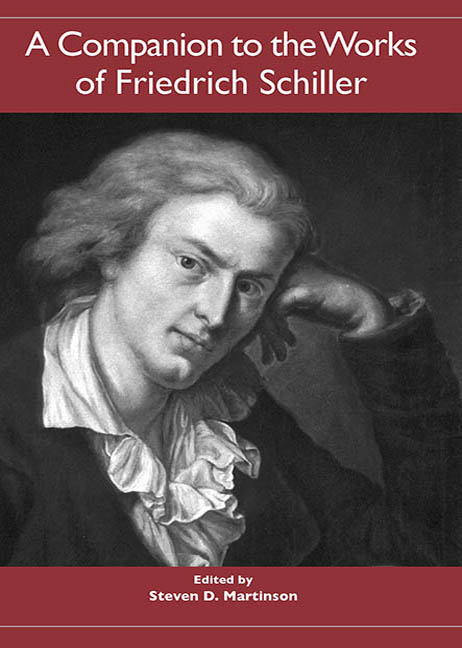Book contents
- Frontmatter
- Dedication
- Contents
- Acknowledgments
- The Works of Friedrich Schiller
- Editions and Abbreviations
- Introduction: Schiller and the New Century
- Intellectual-Historical Settings
- Schiller's Philosophical Aesthetics in Anthropological Perspective
- Schiller and Classical Antiquity
- Schiller the Historian
- Major Writings
- Schiller's Legacy
- Works Cited
- Notes on the Contributors
- Index
Schiller and Classical Antiquity
from Intellectual-Historical Settings
Published online by Cambridge University Press: 28 April 2017
- Frontmatter
- Dedication
- Contents
- Acknowledgments
- The Works of Friedrich Schiller
- Editions and Abbreviations
- Introduction: Schiller and the New Century
- Intellectual-Historical Settings
- Schiller's Philosophical Aesthetics in Anthropological Perspective
- Schiller and Classical Antiquity
- Schiller the Historian
- Major Writings
- Schiller's Legacy
- Works Cited
- Notes on the Contributors
- Index
Summary
Introduction
The historical context of classicism in Schiller's Germany is not easy to grasp. Since various forms of classicism had been prevalent in European letters for around three centuries, at first sight we might view German classicism as a mere footnote. The most forceful statement of the previous phase of classicism had come in France in 1674 with Nicolas Boileau's Horatian L'art poétique, and, in England, Alexander Pope had called in his Essay on Criticism of 1711 for an aesthetic based on Aristotle's rules of poetry, which, as he claims, represents “Nature methodised.” Pope proceeds as follows:
Hear how learn'd Greece her useful rules indites,
When to repress, and when indulge our flights:
High on Parnassus’ top her sons she show'd,
And pointed out those arduous paths they trod;
Held from afar, aloft, the immortal prize,
And urged the rest by equal steps to rise. …
Learn hence for ancient rules a just esteem;
To copy Nature is to copy them. (ll. 92–97, 239–40)
Pope's classicism was meant as an antidote to the excess and tastelessness that he saw running riot among his contemporaries. The adoption of the ancient authors as literary models would mean a restoration of simplicity, moderation, and good sense.
There is a more than superficial resemblance between this and Schiller's position in the ninth of his letters, Über die ästhetische Erziehung der Menschen (On the Aesthetic Education of Man, 1795), where he directs the writer to take his inspiration from antiquity. And yet there are salient differences that prevent us from seeing Schiller's classicism as a restatement of the older position, and a brief survey of these will serve as an introduction to our subject. First, Schiller's references to political corruption and a “barbaric constitution” introduce a note of political critique that is alien to Boileau and Pope and that, in the age of the French Revolution, inevitably raises the emotional pitch of his treatise. Second, Schiller's praise of antiquity does not lead him to espouse the old Aristotelian or Horatian poetics, and in fact he expressly condemns a rule-based art: “Wo der Charakter straff wird und sich verhärtet, da sehen wir … die Kunst in den schweren Fesseln der Regel gehen” (FA 8:583).
- Type
- Chapter
- Information
- A Companion to the Works of Friedrich Schiller , pp. 47 - 66Publisher: Boydell & BrewerPrint publication year: 2005

